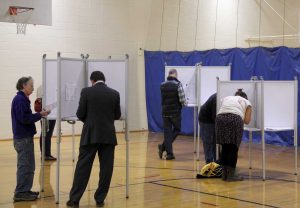We’re All in this Together
The Midterm Elections and Climate Change
By Charles March

The midterm election results may allow positive, bilateral climate legislation even in the narrowly divided House. As of October 26, 2022, nearly two-thirds of Americans wanted more governmental action to combat global warming.
First, the midterm results will not slow the Administration’s executive actions or the federal or state governments on implementing approved projects. We need to press for speedier permitting. Secondly, federal legislation is not foreclosed.
The next Congress will likely re-introduce the “Energy Innovation and Carbon Dividend Act of 2021,” H.R. 2307, along with other climate bills. Because it proposes a fee at the source of extraction, not a complex tax structure, it has already seen approval from some in the industry. Moreover, since carbon tariffs begin on imports to the EU and UK in 2023, on those countries without a comparable carbon fee, H.R. 2307 could get bilateral support! Massive lobbying will be needed here. The past seven-year delay already threatens the Paris Agreement goal of limiting global temperature rise to 1.5 degree Celsius. The UN’s IPCC report for the COP27 climate conference states that the difference between a 1.5 degree rise and a 2.0 rise in temperature threatens millions more people being exposed to record heat, loss of drinking water, loss of livelihoods and lives.
There is some good news.
Green energy, a departure from fossil fuels, saves money! Worldwide investment in green energy surpassed that in fossil fuels. And now, solar-panel production capacity exists to produce needed energy to limit warming to below 2 degrees Celsius. But a faster decarbonization effort is critical for the planet and could add trillions of dollars to the world economy by 2050.
The historic Inflation Reduction Act of 2022 (IRA), gives us that climate and economic action plan. It warrants a clear summarization for the general public. The legislation commits $370 billion to low-carbon technologies like wind turbines, solar panels, nuclear power plants, hydrogen fuels, electric vehicles, and electric heat pumps. Proper implementation could cut US emissions by 40 percent below 2005 levels by 2030.
Environmental activist Bill McKibben, speaking post-election on The Ezra Klein Show, noted that we need a collective mobilization to implement the IRA. We must pressure both federal and state governments to speed up the building and permitting of clean energy projects. The future is in our hands.
Charles March is a lawyer advocating for injured workers and a Citizens Climate Lobby volunteer.
We’re All in this Together is a monthly Climate Justice column provided by the Portland chapter of Citizens’ Climate Lobby.





